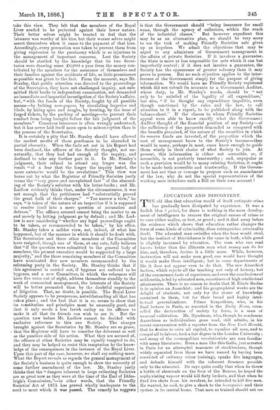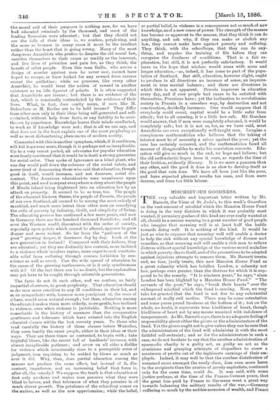EDUCATION AND DISCONTENT.
THE old idea that education would of itself extirpate crime has gradually been dissipated by experience. It was a foolish idea a priori, for there is nothing in the mere develop- ment of intelligence to remove the original causes of crime or to cure either malice, or lust, or greed ; and it died away before the evidence which shows that education rather changes the form of some kinds of criminality, than extinguishes criminality itself. The educated man swindles when the boor would steal, but the instinct of thievishness is the same in both, while greed is slightly increased by education. The man who can read knows better than the illiterate man what money can do for him, and, therefore, desires it a little more. While, however, instruction will not make men good, one would have thought it would make them intelligent ; but in some departments of life it does not appear even to do that. The new Anarchist faction, which rejects all the teaching not only of history, but of the commonest facts of experience, and even the conclusions of arithmetic, is led by educated men, sometimes of high intellectual attainments. There is no reason to doubt that M. Blisee Rechis is in opinion an Anarchist; and his geographical works are the delight of students, not only for the stores of knowledge contained in them, but for their broad and highly intel- lectual generalisations. Prince Krapotkine, who, in his "final lecture in Paris, as reported in the Daily News, coun- selled the destruction of society by force, is a man of unusual cultivation. Mr. Hyndman, who, though he condemns Anarchism as individualism gone mad, still admits, in his recent conversation with a reporter from the New York Herald, that he desires to seize all capital, to equalise all men, and to compel all to labour, took a fair degree in the London University ; and many of the cosmopolitan revolutionists are men familiar with many literatures. Even a man like this Gallo, just arrested in Paris for an attempted massacre of stockbrokers, though widely separated from those we have named by having been convicted of ordinary crime (coining), speaks five languages, and defends himself with the coherent firmness possible only to the educated. He says quite coolly that when he threw a bottle of chemicals on the floor of the Bourse, he hoped the asphyxiating vapour would kill forty brokers, and that when he fired five shots from his revolver, he intended to kill five men. He wanted, he said, to give a shock to the bourgeoisie and their system in its central home. That men so trained should not see
the moral evil of their purposes is nothing new, for we have had. educated criminals by the thousand, and most of the leading Terrorists were educated ; but that they should not see the folly of their ideas is, we confess, perplexing, and the more so because in many cases it must be the intellect rather than the heart that is going wrong. Many of the most dangerous Anarchists who profess to despise the old moral law, sacrifice themselves to their cause as readily as the innocent, and live lives of privation and pain for, as they think, the benefit of other people: Even this man Gallo, who avows a design of murder against men he never saw, cannot have hoped to escape, or have looked for any reward from success except the guillotine ; while we presume, like every other Aintrehist, he would treat the-notion of reward in another existence as an idle figment of priests. It is often suggested that Anarchists are insane ; but there is no evidence of the fact, which is constantly contradicted by the evidence of their lives. What, in fact, does sanity mean, if men like M. Delescluze or M. Reclus are to be held insane ? They differ from other men only in their ideas being self-generated and self- sustained, without help from facts, or any liability to be over- thrown by experience. Knowledge leaves their minds unaffected, to work as if knowledge were- not ; that is all we can say, and that does not in the least explain one of the most perplexing as well as most disheartening phenomena of modern society.
Connected with this is another symptom, which, if it continues, will kill hope even more, though it is perhaps not so inexplicable. Up to a very recent °period, all. advocates for popular education were firmly convinced that it would be in itself a strong guarantee for social order. They spoke of Ignorance as a blind giant, who one day would pull down the columns of the social fabric, and never tired of denouncing those who said that education, though good in itself, would increase, and not dee,cease, social dis- content. The American educationists were unanimous upon this point, and used to repeat everywhere a story about the people of Rhode Island being frightened into an education law by an attack on property. It seemed to be so true, too. The people of the educated Eastern States, the people of Prussia, the people of our own Scotland, all seemed to be among the most orderly of mankind, and much more intent than other men on remedying the evils of poverty by industry, thrift, and simplicity of living. The educating process has continued a few more years, and now in Germany there are five hundred thousand Socialists ; and all over the Western world, discontent with the order of society, especially upon points which cannot be altered, appears to grow deeper and more violent. So far from the "patience of the poor" growing deeper, it decreases day by day. Look at the new generation in Ireland! Compared with their fathers, they are educated ; yet they are distinctly less content, more inclined to a violence which involves rapine, more eager to seek unattain- able relief from suffering through courses forbidden by con- science as well as creed. Can the wide spread of education be the cause of the growing restlessness, or is it only synchronous with it? Of the fact there can be no doubt, but the explanation may yet have to be sought through miserable generations.
The facts do not fit each other, and we confess, as fairly impartial observers, to great perplexity. That education should make men more sensitive to any ill conditions in their lot, and
m sympathetic with, because more percipient of, the woes of others, would seem natural enough ; but then, education among theedueated makes them more orderly, more gentle, less inclined to violence, even when violence is justifiable. Nothing is more remarkable in the history of manners than, the comparative gentleness and tolerance which have entered into the English educated classes within the last seventy years. To those who read carefully the history of those classes before Waterloo, they seem hardly the same people, either in their ideas of their ways. They are three times as contented, to begin with ; take frightful blows, like the recent fall of landlords' incomes, with almost inexplicable patience ; and avow- on all sides a dislike for violence which occasionally rises to a perceptible error of judgment, iron requiring to be welded by blows as much as ever it did. Why, then, does partial education among the masses not produce the same effect, but instead of it, dis- content, impatience, and an increasing belief that force is, after all, theremedy? We suppose the truth is that education at first only awakens and makes men perceive what they were blind to before, and that tolerance of what they perceive is of mit& slower growth. The petulance of the schoolboy comes on the nation, as well as the new apprehension ; while the belief,
or partial belief, in violence is.a consequence not so much of new knowledge, as of a new sense of power. The strength of themasses has become so apparent to the masses, that they think it can do anything, and ask why, if they can make or abolish any law, they cannot make laws against poverty and suffering.
They think, with the schoolboys, that they can do any- thing, and require the training of life before they can recognise the fixedness of conditions. That is a fair ex- planation, but still, it is not perfectly satisfactory. It would leave us the hope that wisdom would come with more and longer education,—as, indeed, it has come to part of the popu- lation of Scotland. But still, education, however slight, ought to produce in all directions an increase of sense, an improve- ment in true mental balance ; and there are directions in which this is not apparent. Prussia improves in education every day, and if ever people had cause to be satisfied with themselves, Prussians have ; yet the inclination to revolutionise society in Prussia in a senseless way, by destruction and not construction, decidedly increases. One would suppose that if everybody could count, capital would be a little safer from attack ; but to all seeming, it is a little less safe. Mr: Goschen would answer, that if men were completely educated, it would be completely safe ; but it is not so, for, as we have said, most Anarchists are even exceptionally well-taught men. Imagine a conspicuous mathematician who believes that the taking of interest must be of necessity a crime against the poor; yet the case has certainly occurred, and the mathematician faced all manner of disagreeables to make his conviction concrete. Edu- cation will give us much in the end, we hope and believe ; but the old enthusiastic hopes from it were, as regards the time of their fruition, evidently illusory. It is no more a panacea than any other, and the good it does is as slow to develop itself as the good that rain does. We have all been just like the poor, and have expected pleasant results too soon, and from mere decrees, and from too little labour.







































 Previous page
Previous page